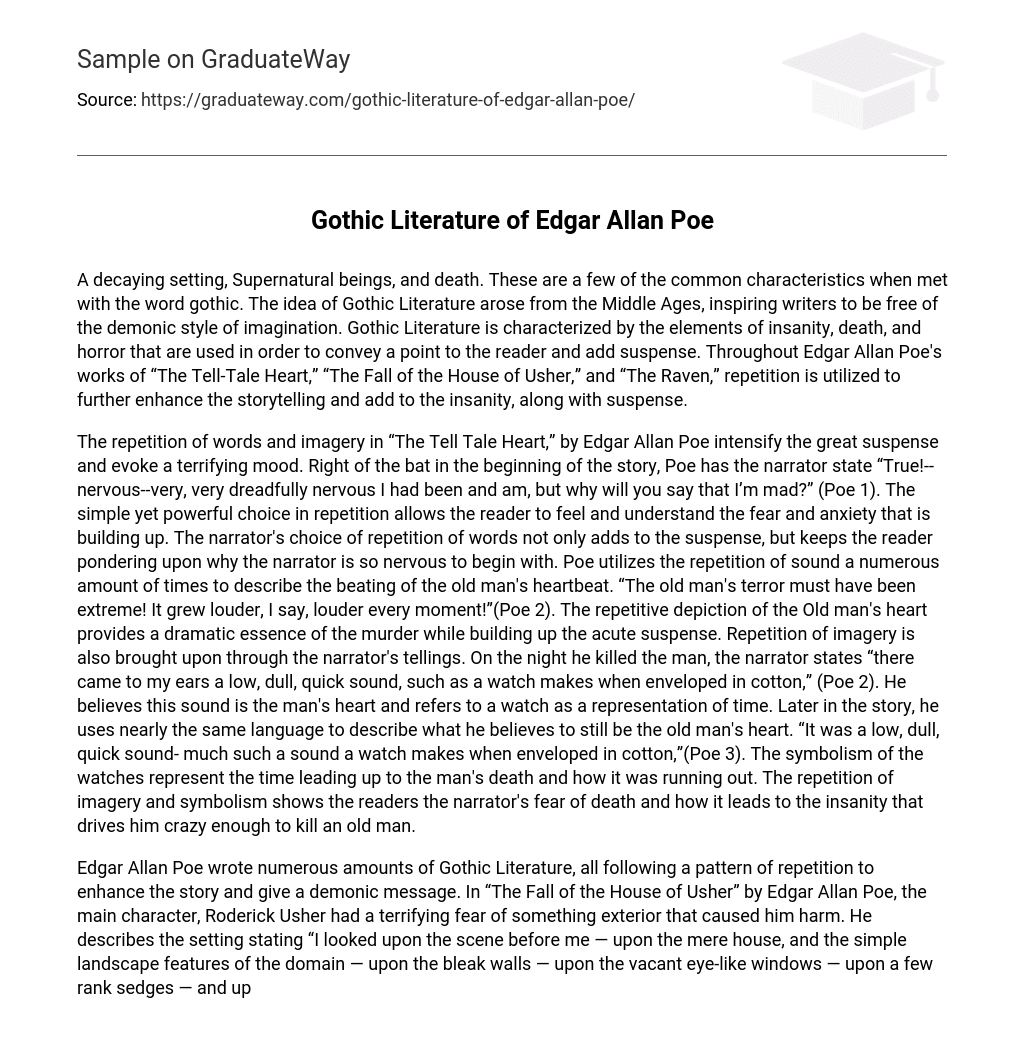A decaying setting, Supernatural beings, and death. These are a few of the common characteristics when met with the word gothic. The idea of Gothic Literature arose from the Middle Ages, inspiring writers to be free of the demonic style of imagination. Gothic Literature is characterized by the elements of insanity, death, and horror that are used in order to convey a point to the reader and add suspense. Throughout Edgar Allan Poe’s works of “The Tell-Tale Heart,” “The Fall of the House of Usher,” and “The Raven,” repetition is utilized to further enhance the storytelling and add to the insanity, along with suspense.
The repetition of words and imagery in “The Tell Tale Heart,” by Edgar Allan Poe intensify the great suspense and evoke a terrifying mood. Right of the bat in the beginning of the story, Poe has the narrator state “True!–nervous–very, very dreadfully nervous I had been and am, but why will you say that I’m mad?” (Poe 1). The simple yet powerful choice in repetition allows the reader to feel and understand the fear and anxiety that is building up. The narrator’s choice of repetition of words not only adds to the suspense, but keeps the reader pondering upon why the narrator is so nervous to begin with. Poe utilizes the repetition of sound a numerous amount of times to describe the beating of the old man’s heartbeat. “The old man’s terror must have been extreme! It grew louder, I say, louder every moment!”(Poe 2). The repetitive depiction of the Old man’s heart provides a dramatic essence of the murder while building up the acute suspense. Repetition of imagery is also brought upon through the narrator’s tellings. On the night he killed the man, the narrator states “there came to my ears a low, dull, quick sound, such as a watch makes when enveloped in cotton,” (Poe 2). He believes this sound is the man’s heart and refers to a watch as a representation of time. Later in the story, he uses nearly the same language to describe what he believes to still be the old man’s heart. “It was a low, dull, quick sound- much such a sound a watch makes when enveloped in cotton,”(Poe 3). The symbolism of the watches represent the time leading up to the man’s death and how it was running out. The repetition of imagery and symbolism shows the readers the narrator’s fear of death and how it leads to the insanity that drives him crazy enough to kill an old man.
Edgar Allan Poe wrote numerous amounts of Gothic Literature, all following a pattern of repetition to enhance the story and give a demonic message. In “The Fall of the House of Usher” by Edgar Allan Poe, the main character, Roderick Usher had a terrifying fear of something exterior that caused him harm. He describes the setting stating “I looked upon the scene before me — upon the mere house, and the simple landscape features of the domain — upon the bleak walls — upon the vacant eye-like windows — upon a few rank sedges — and upon a few white trunks of decayed trees — with an utter depression of soul,”(Poe 551). The use of “upon” further illustrates the gothic setting, while giving the windows human traits. Later on in the story, he describes the vacant eye like windows again, “I reined my horse to the precipitous brink of a black and lurid tarn that lay in unruffled lustre by the dwelling, and gazed down–but with a shudder even more thrilling than before–upon the remodelled and inverted images of the grey sedge, and the ghastly tree-stems, and the vacant and eye-like windows,”(Poe 551). The repetition of the setting- specifically the eye-like windows- makes the readers view the windows as a figurative comparison since the house belongs to Usher. The repetition of the “vacant” and “eye-like” windows further illustrate the houses relation to Usher and has a powerful effect on the reader. Poe tends to repeat the word “upon” many times, particularly when he is in a state of fear. “Not hear it? — yes, I hear it, and have heard it. Long — long — long — many minutes, many hours, many days, have I heard it —,”(Poe 562). The repetitive use of sound and time stresses the idea of multiple instances that have occurred, leading to a build-up of suspense.
In “The Raven,” by Edgar Allan Poe, Poe uses repetition of words to create a deep tone for the poem. The intention of the poem is set around a man who is grieving for the loss of his love Lenore. He has a mindset of despair, only to have a Raven come and talk to him. In the First stanza the man states, “While I nodded, nearly napping, suddenly there came a tapping, As of someone gently rapping, rapping at my chamber door-,”(Poe 1). The depiction of the sounds further represents the grief that emerges in the narrator’s mind. It is a ceaseless and unrelenting sound that never leaves the narrator throughout the story and eventually rubs off on the readers. He then states “From my books surcease of sorrow-sorrow for the lost Lenore,”(Poe 1) The repetitive statement of sorrow represents the endless pain he is feeling. Losing his love has shattered him and draws out emotion to the reader. Upon the Raven’s arrival, it constantly repeats the word “Nevermore” after each sentence. The repetition echos sadness and only adds to the despair the narrator is experiencing. It reiterates the grief and fatalistic hopelessness that gradually forms the emotional tone for the story.
Within the works of free-spirited writer Edgar Allan Poe, there is a common element of repetition creating suspense for the reader. The repetition puts emphasis on the insanity adding to the suspense while creating a sense of emotion.





